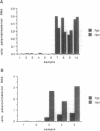Abstract
The preferential inactivation of the paternal X chromosome in extraembryonic cells during early mouse development is an example of parental imprinting, but it has not been studied at the transcriptional level because standard methods of measuring RNA levels do not allow detection of allele-specific RNAs in individual early embryos. We sought to determine whether the paternal allele of the X chromosome-linked gene for 3-phosphoglycerate kinase 1 (Pgk-1), which is located very near the center of X chromosome inactivation, is transcribed prior to differentiation of extraembryonic lineages. Previous reports indicated that in heterozygous embryos there is a delay in the appearance of the phosphoglycerate kinase 1 allozyme encoded by the paternal X chromosome until 2 days after the appearance of the corresponding maternal allozyme. We report results obtained by use of a reverse transcription/PCR-based method which allows the quantitative measurement of allele-specific RNA. The assay is sensitive enough for the quantitative analysis in single embryos of allele-specific transcripts differing by only one nucleotide. We have used this assay to analyze mouse embryos heterozygous at the Pgk-1 and Hprt [hypoxanthine (guanine) phosphoribosyltransferase] loci, and we find that individual 8-cell and blastocyst embryos express both Hprt and Pgk-1 paternal transcripts, as do pooled 2- to 4-cell embryos. These results are discussed in view of the apparent temporal delay in paternal expression of the Pgk-1 gene at the enzyme level.
Full text
PDF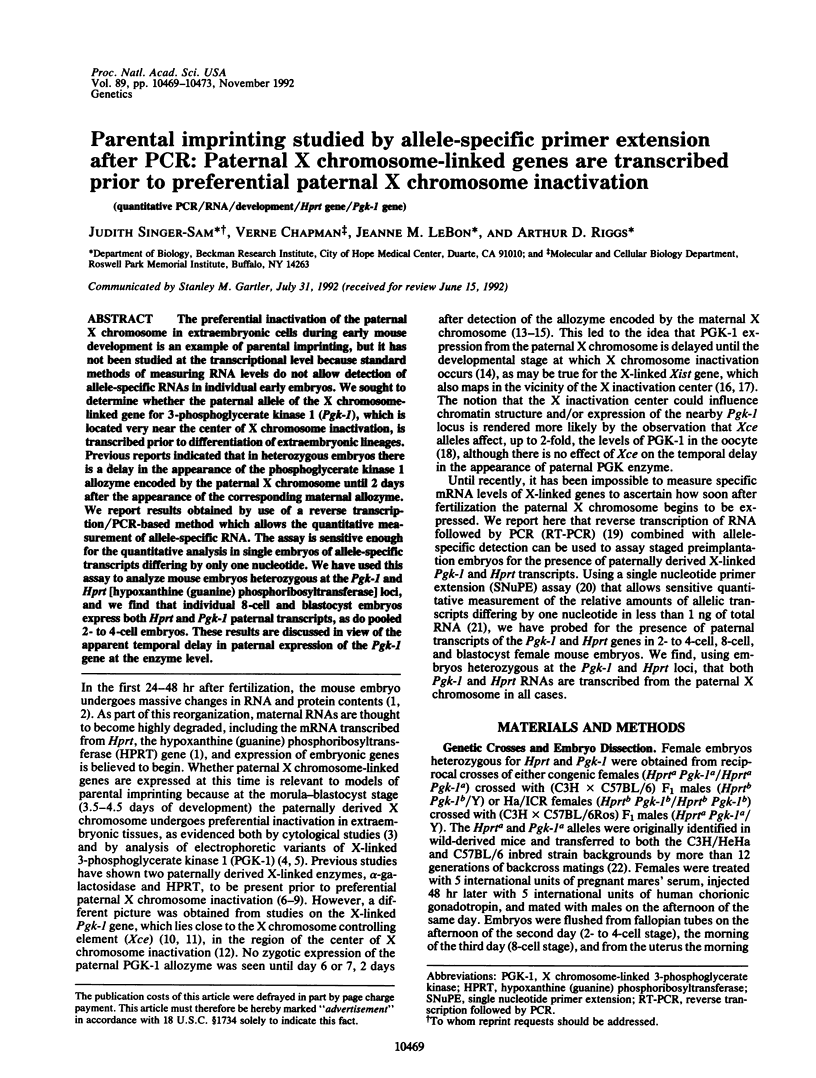
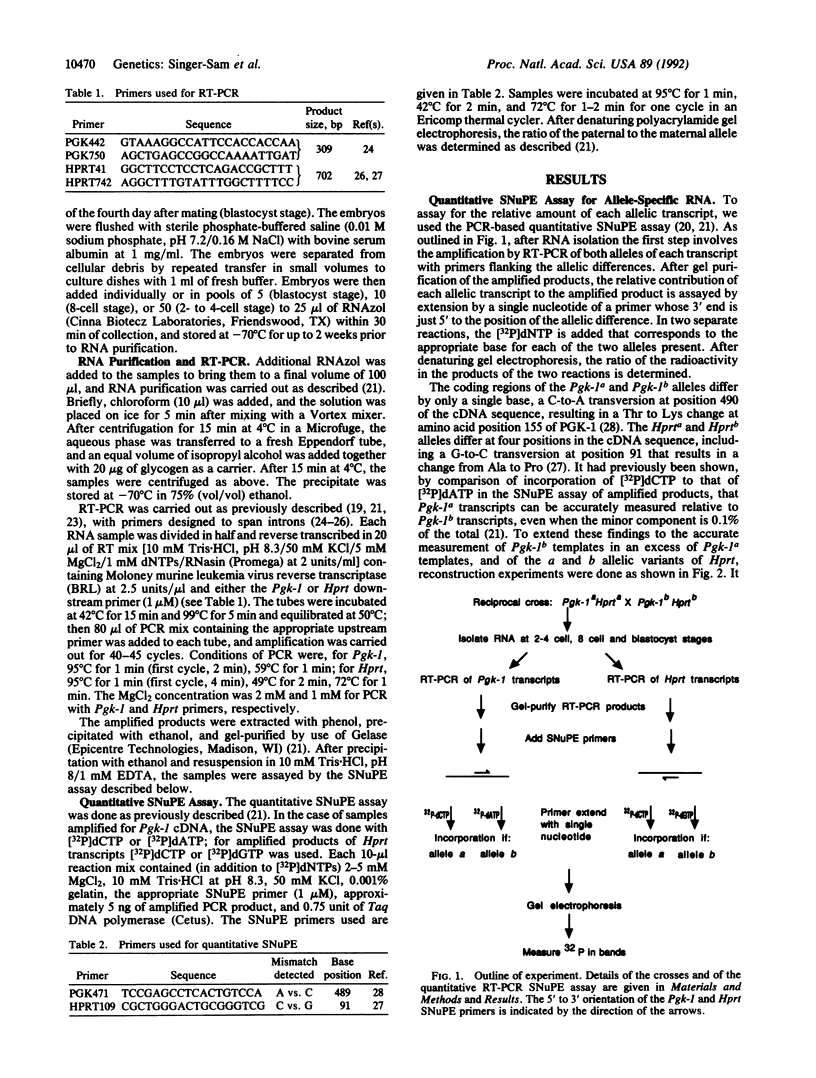
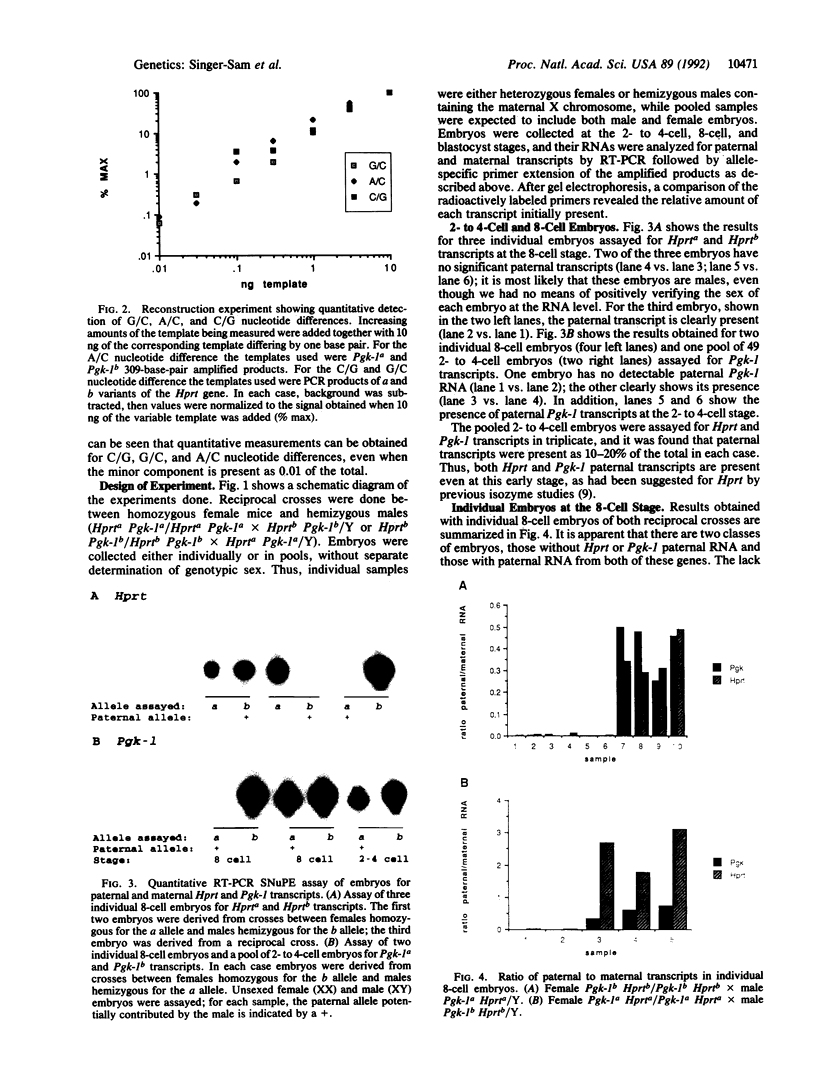
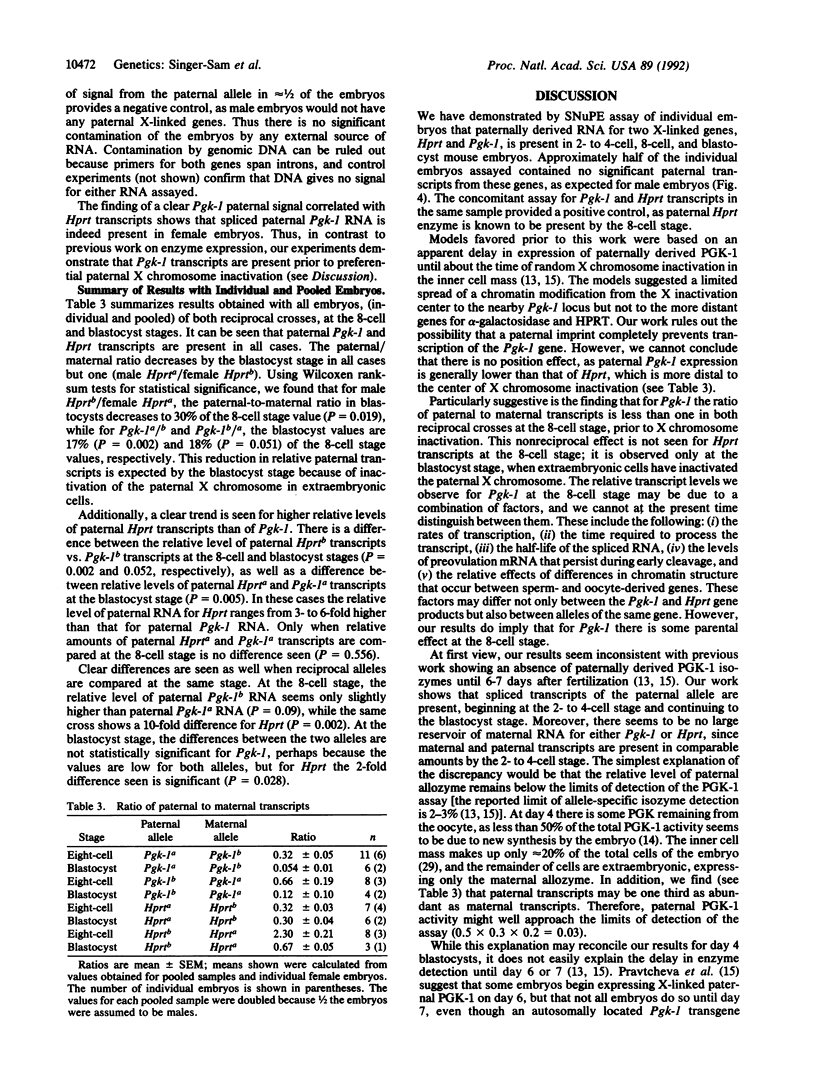
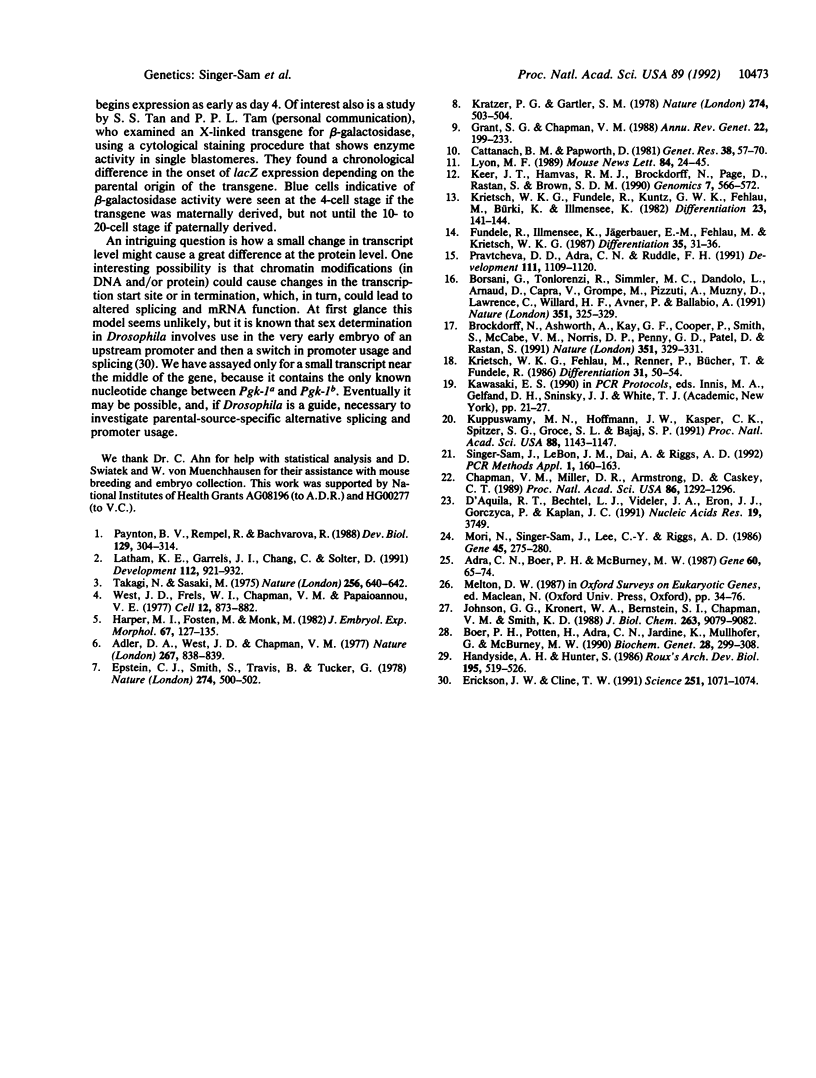
Images in this article
Selected References
These references are in PubMed. This may not be the complete list of references from this article.
- Adler D. A., West J. D., Chapman V. M. Expression of alpha-galactosidase in preimplantation mouse embryos. Nature. 1977 Jun 30;267(5614):838–839. doi: 10.1038/267838a0. [DOI] [PubMed] [Google Scholar]
- Adra C. N., Boer P. H., McBurney M. W. Cloning and expression of the mouse pgk-1 gene and the nucleotide sequence of its promoter. Gene. 1987;60(1):65–74. doi: 10.1016/0378-1119(87)90214-9. [DOI] [PubMed] [Google Scholar]
- Boer P. H., Potten H., Adra C. N., Jardine K., Mullhofer G., McBurney M. W. Polymorphisms in the coding and noncoding regions of murine Pgk-1 alleles. Biochem Genet. 1990 Jun;28(5-6):299–308. doi: 10.1007/BF02401419. [DOI] [PubMed] [Google Scholar]
- Borsani G., Tonlorenzi R., Simmler M. C., Dandolo L., Arnaud D., Capra V., Grompe M., Pizzuti A., Muzny D., Lawrence C. Characterization of a murine gene expressed from the inactive X chromosome. Nature. 1991 May 23;351(6324):325–329. doi: 10.1038/351325a0. [DOI] [PubMed] [Google Scholar]
- Brockdorff N., Ashworth A., Kay G. F., Cooper P., Smith S., McCabe V. M., Norris D. P., Penny G. D., Patel D., Rastan S. Conservation of position and exclusive expression of mouse Xist from the inactive X chromosome. Nature. 1991 May 23;351(6324):329–331. doi: 10.1038/351329a0. [DOI] [PubMed] [Google Scholar]
- Cattanach B. M., Papworth D. Controlling elements in the mouse. V. Linkage tests with X-linked genes. Genet Res. 1981 Aug;38(1):57–70. doi: 10.1017/s0016672300020401. [DOI] [PubMed] [Google Scholar]
- Chapman V. M., Miller D. R., Armstrong D., Caskey C. T. Recovery of induced mutations for X chromosome-linked muscular dystrophy in mice. Proc Natl Acad Sci U S A. 1989 Feb;86(4):1292–1296. doi: 10.1073/pnas.86.4.1292. [DOI] [PMC free article] [PubMed] [Google Scholar]
- D'Aquila R. T., Bechtel L. J., Videler J. A., Eron J. J., Gorczyca P., Kaplan J. C. Maximizing sensitivity and specificity of PCR by pre-amplification heating. Nucleic Acids Res. 1991 Jul 11;19(13):3749–3749. doi: 10.1093/nar/19.13.3749. [DOI] [PMC free article] [PubMed] [Google Scholar]
- Epstein C. J., Smith S., Travis B., Tucker G. Both X chromosomes function before visible X-chromosome inactivation in female mouse embryos. Nature. 1978 Aug 3;274(5670):500–503. doi: 10.1038/274500a0. [DOI] [PubMed] [Google Scholar]
- Erickson J. W., Cline T. W. Molecular nature of the Drosophila sex determination signal and its link to neurogenesis. Science. 1991 Mar 1;251(4997):1071–1074. doi: 10.1126/science.1900130. [DOI] [PubMed] [Google Scholar]
- Fundele R., Illmensee K., Jägerbauer E. M., Fehlau M., Krietsch W. K. Sequential expression of maternally inherited phosphoglycerate kinase-1 in the early mouse embryo. Differentiation. 1987;35(1):31–36. doi: 10.1111/j.1432-0436.1987.tb00148.x. [DOI] [PubMed] [Google Scholar]
- Grant S. G., Chapman V. M. Mechanisms of X-chromosome regulation. Annu Rev Genet. 1988;22:199–233. doi: 10.1146/annurev.ge.22.120188.001215. [DOI] [PubMed] [Google Scholar]
- Harper M. I., Fosten M., Monk M. Preferential paternal X inactivation in extraembryonic tissues of early mouse embryos. J Embryol Exp Morphol. 1982 Feb;67:127–135. [PubMed] [Google Scholar]
- Johnson G. G., Kronert W. A., Bernstein S. I., Chapman V. M., Smith K. D. Altered turnover of allelic variants of hypoxanthine phosphoribosyltransferase is associated with N-terminal amino acid sequence variation. J Biol Chem. 1988 Jul 5;263(19):9079–9082. [PubMed] [Google Scholar]
- Keer J. T., Hamvas R. M., Brockdorff N., Page D., Rastan S., Brown S. D. Genetic mapping in the region of the mouse X-inactivation center. Genomics. 1990 Aug;7(4):566–572. doi: 10.1016/0888-7543(90)90200-e. [DOI] [PubMed] [Google Scholar]
- Kratzer P. G., Gartler S. M. HGPRT activity changes in preimplantation mouse embryos. Nature. 1978 Aug 3;274(5670):503–504. doi: 10.1038/274503a0. [DOI] [PubMed] [Google Scholar]
- Krietsch W. K., Fehlau M., Renner P., Bücher T., Fundele R. Expression of X-linked phosphoglycerate kinase in early mouse embryos homozygous at the Xce locus. Differentiation. 1986;31(1):50–54. doi: 10.1111/j.1432-0436.1986.tb00382.x. [DOI] [PubMed] [Google Scholar]
- Krietsch W. K., Fundele R., Kuntz G. W., Fehlau M., Bürki K., Illmensee K. The expression of X-linked phosphoglycerate kinase in the early mouse embryo. Differentiation. 1982;23(2):141–144. doi: 10.1111/j.1432-0436.1982.tb01276.x. [DOI] [PubMed] [Google Scholar]
- Kuppuswamy M. N., Hoffmann J. W., Kasper C. K., Spitzer S. G., Groce S. L., Bajaj S. P. Single nucleotide primer extension to detect genetic diseases: experimental application to hemophilia B (factor IX) and cystic fibrosis genes. Proc Natl Acad Sci U S A. 1991 Feb 15;88(4):1143–1147. doi: 10.1073/pnas.88.4.1143. [DOI] [PMC free article] [PubMed] [Google Scholar]
- Latham K. E., Garrels J. I., Chang C., Solter D. Quantitative analysis of protein synthesis in mouse embryos. I. Extensive reprogramming at the one- and two-cell stages. Development. 1991 Aug;112(4):921–932. doi: 10.1242/dev.112.4.921. [DOI] [PubMed] [Google Scholar]
- Melton D. W. HPRT gene organization and expression. Oxf Surv Eukaryot Genes. 1987;4:34–76. [PubMed] [Google Scholar]
- Mori N., Singer-Sam J., Lee C. Y., Riggs A. D. The nucleotide sequence of a cDNA clone containing the entire coding region for mouse X-chromosome-linked phosphoglycerate kinase. Gene. 1986;45(3):275–280. doi: 10.1016/0378-1119(86)90025-9. [DOI] [PubMed] [Google Scholar]
- Paynton B. V., Rempel R., Bachvarova R. Changes in state of adenylation and time course of degradation of maternal mRNAs during oocyte maturation and early embryonic development in the mouse. Dev Biol. 1988 Oct;129(2):304–314. doi: 10.1016/0012-1606(88)90377-6. [DOI] [PubMed] [Google Scholar]
- Pravtcheva D. D., Adra C. N., Ruddle F. H. Timing of paternal Pgk-1 expression in embryos of transgenic mice. Development. 1991 Apr;111(4):1109–1120. doi: 10.1242/dev.111.4.1109. [DOI] [PubMed] [Google Scholar]
- Singer-Sam J., LeBon J. M., Dai A., Riggs A. D. A sensitive, quantitative assay for measurement of allele-specific transcripts differing by a single nucleotide. PCR Methods Appl. 1992 Feb;1(3):160–163. doi: 10.1101/gr.1.3.160. [DOI] [PubMed] [Google Scholar]
- Takagi N., Sasaki M. Preferential inactivation of the paternally derived X chromosome in the extraembryonic membranes of the mouse. Nature. 1975 Aug 21;256(5519):640–642. doi: 10.1038/256640a0. [DOI] [PubMed] [Google Scholar]
- West J. D., Frels W. I., Chapman V. M., Papaioannou V. E. Preferential expression of the maternally derived X chromosome in the mouse yolk sac. Cell. 1977 Dec;12(4):873–882. doi: 10.1016/0092-8674(77)90151-9. [DOI] [PubMed] [Google Scholar]



